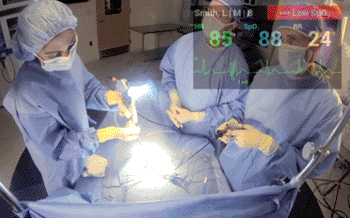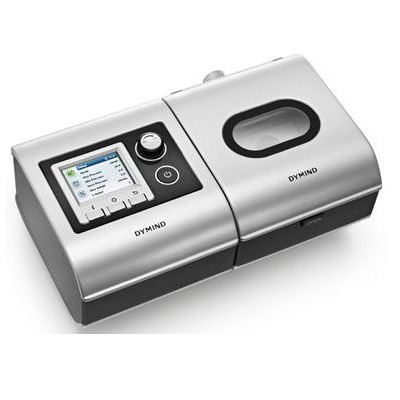Google Glass Helps Deliver Real-Time Patient Data 
|
By HospiMedica International staff writers Posted on 29 Oct 2013 |

Image: Observing an operation via Google Glass (Photo courtesy of Google).
A proof-of-concept demonstration verifies the concept of seamless transfer of patient vital signs into Google Glass, potentially providing physicians with hands-free access to critical clinical information.
The purpose of the demonstration, undertaken by Royal Philips Electronics (Amsterdam, The Netherlands) and Accenture Technology Labs (Dublin, Ireland), was to explore the potential use of the Google Glass head-mounted display in clinical settings, using Philips IntelliVue Solutions and other Philips healthcare solutions. A doctor wearing the display simultaneously monitored a patient’s vital signs and reacted to surgical procedural developments, without having to turn away from the patient or procedure, as well as enlisting assistance from doctors in other locations.
Additional future research topics could include accessing a near real-time feed of vital signs in Google Glass; calling up images and other patient data by clinicians from anywhere in the hospital; accessing a presurgery safety checklist; giving clinicians the ability to view the patient in the recovery room after surgery; conducting live, first-person video conferences with other medical personnel; and using Google Glass to improve the effectiveness and efficiency of performing surgical procedures.
“We live in a world where being nimble is key and industry-altering ideas need to be converted to practical solutions that people can use,” said Michael Mancuso, CEO of patient care and clinical informatics at Philips Healthcare. “This research explores how doctors can achieve better access to the right information at the right time so they can focus on more efficient and effective patient care. It’s a first step in researching how existing technologies can be applied to improve the quality of life of patients.”
“Accenture’s work with Philips showcases a powerful use of wearable devices in the healthcare industry, helping physicians perform their jobs more effectively and enhancing care for patients,” said Paul Daugherty, chief technology officer of Accenture. “This exciting work highlights the potential of digital technologies to transform the way we work and live, and we’re pleased to have collaborated with Philips to help bring this vision to life.”
Google Glass is being developed by Google (Menlo Park, CA, USA) with the mission of producing a mass-market ubiquitous computer that displays data in a smartphone-like hands-free format that can interact with the Internet via natural language voice commands. The wearable computer comes with a camera, GPS, Bluetooth, microphone, and optical head-mounted display (OHMD) that sits unobtrusively in the corner of one lens of a pair of glasses.
Related Links:
Royal Philips Electronics
Accenture Technology Labs
Google
The purpose of the demonstration, undertaken by Royal Philips Electronics (Amsterdam, The Netherlands) and Accenture Technology Labs (Dublin, Ireland), was to explore the potential use of the Google Glass head-mounted display in clinical settings, using Philips IntelliVue Solutions and other Philips healthcare solutions. A doctor wearing the display simultaneously monitored a patient’s vital signs and reacted to surgical procedural developments, without having to turn away from the patient or procedure, as well as enlisting assistance from doctors in other locations.
Additional future research topics could include accessing a near real-time feed of vital signs in Google Glass; calling up images and other patient data by clinicians from anywhere in the hospital; accessing a presurgery safety checklist; giving clinicians the ability to view the patient in the recovery room after surgery; conducting live, first-person video conferences with other medical personnel; and using Google Glass to improve the effectiveness and efficiency of performing surgical procedures.
“We live in a world where being nimble is key and industry-altering ideas need to be converted to practical solutions that people can use,” said Michael Mancuso, CEO of patient care and clinical informatics at Philips Healthcare. “This research explores how doctors can achieve better access to the right information at the right time so they can focus on more efficient and effective patient care. It’s a first step in researching how existing technologies can be applied to improve the quality of life of patients.”
“Accenture’s work with Philips showcases a powerful use of wearable devices in the healthcare industry, helping physicians perform their jobs more effectively and enhancing care for patients,” said Paul Daugherty, chief technology officer of Accenture. “This exciting work highlights the potential of digital technologies to transform the way we work and live, and we’re pleased to have collaborated with Philips to help bring this vision to life.”
Google Glass is being developed by Google (Menlo Park, CA, USA) with the mission of producing a mass-market ubiquitous computer that displays data in a smartphone-like hands-free format that can interact with the Internet via natural language voice commands. The wearable computer comes with a camera, GPS, Bluetooth, microphone, and optical head-mounted display (OHMD) that sits unobtrusively in the corner of one lens of a pair of glasses.
Related Links:
Royal Philips Electronics
Accenture Technology Labs
Channels
Critical Care
view channel
Light-Based Technology to Measure Brain Blood Flow Could Diagnose Stroke and TBI
Monitoring blood flow in the brain is crucial for diagnosing and treating neurological conditions such as stroke, traumatic brain injury (TBI), and vascular dementia. However, current imaging methods like... Read more
AI Heart Attack Risk Assessment Tool Outperforms Existing Methods
For decades, doctors have relied on standardized scoring systems to assess patients with the most common type of heart attack—non-ST-elevation acute coronary syndrome (NSTE-ACS). The GRACE score, used... Read moreSurgical Techniques
view channel
Minimally Invasive Endoscopic Surgery Improves Severe Stroke Outcomes
Intracerebral hemorrhage, a type of stroke caused by bleeding deep within the brain, remains one of the most challenging neurological emergencies to treat. Accounting for about 15% of all strokes, it carries... Read more
Novel Glue Prevents Complications After Breast Cancer Surgery
Seroma and prolonged lymphorrhea are among the most common complications following axillary lymphadenectomy in breast cancer patients. These postoperative issues can delay recovery and postpone the start... Read morePatient Care
view channel
Revolutionary Automatic IV-Line Flushing Device to Enhance Infusion Care
More than 80% of in-hospital patients receive intravenous (IV) therapy. Every dose of IV medicine delivered in a small volume (<250 mL) infusion bag should be followed by subsequent flushing to ensure... Read more
VR Training Tool Combats Contamination of Portable Medical Equipment
Healthcare-associated infections (HAIs) impact one in every 31 patients, cause nearly 100,000 deaths each year, and cost USD 28.4 billion in direct medical expenses. Notably, up to 75% of these infections... Read more
Portable Biosensor Platform to Reduce Hospital-Acquired Infections
Approximately 4 million patients in the European Union acquire healthcare-associated infections (HAIs) or nosocomial infections each year, with around 37,000 deaths directly resulting from these infections,... Read moreFirst-Of-Its-Kind Portable Germicidal Light Technology Disinfects High-Touch Clinical Surfaces in Seconds
Reducing healthcare-acquired infections (HAIs) remains a pressing issue within global healthcare systems. In the United States alone, 1.7 million patients contract HAIs annually, leading to approximately... Read moreBusiness
view channel
Philips and Masimo Partner to Advance Patient Monitoring Measurement Technologies
Royal Philips (Amsterdam, Netherlands) and Masimo (Irvine, California, USA) have renewed their multi-year strategic collaboration, combining Philips’ expertise in patient monitoring with Masimo’s noninvasive... Read more
B. Braun Acquires Digital Microsurgery Company True Digital Surgery
The high-end microsurgery market in neurosurgery, spine, and ENT is undergoing a significant transformation. Traditional analog microscopes are giving way to digital exoscopes, which provide improved visualization,... Read more
CMEF 2025 to Promote Holistic and High-Quality Development of Medical and Health Industry
The 92nd China International Medical Equipment Fair (CMEF 2025) Autumn Exhibition is scheduled to be held from September 26 to 29 at the China Import and Export Fair Complex (Canton Fair Complex) in Guangzhou.... Read more













